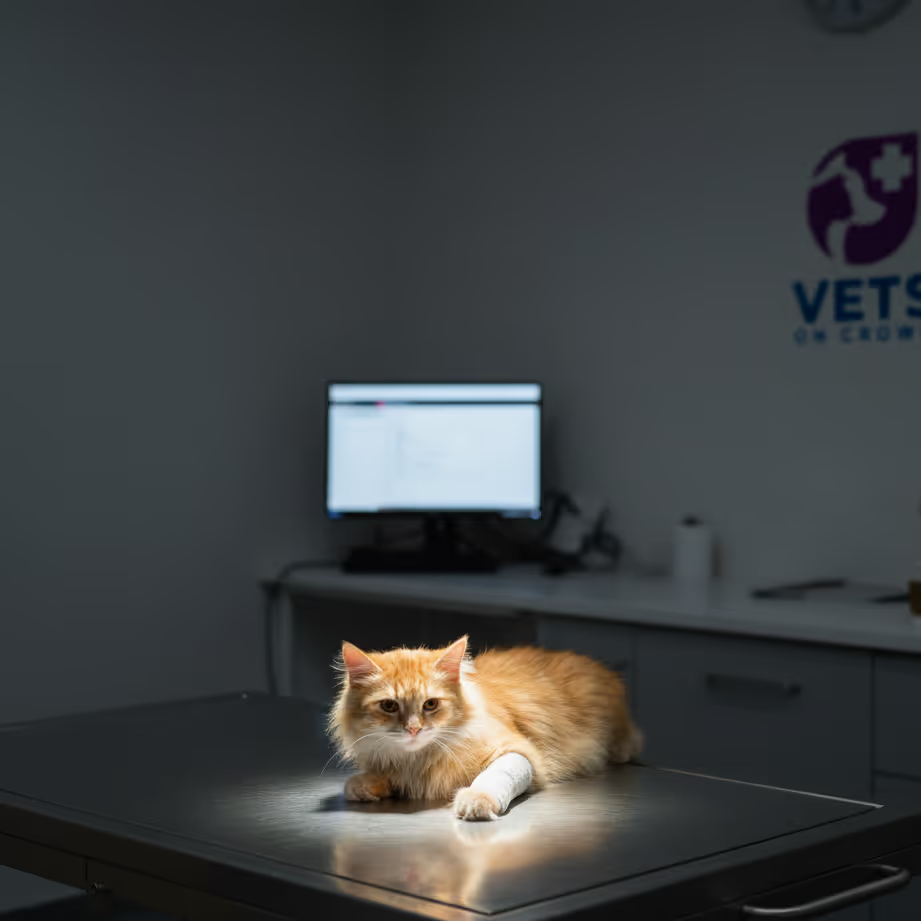Emergency pet care in Surry Hills NSW
Our clinic is open from 7:30 AM to 8 PM on weekdays and 10 AM to 4 PM on weekends.
If your pet needs urgent care after hours, please contact SASH Alexandria or UVTHS Camperdown


Last updated: 1 November, 2025

We know emergencies can be overwhelming
Our experienced team is here to support you with calm, compassionate care and clear guidance every step of the way.
If your pet is experiencing any of the following, seek immediate veterinary care:
Severe or unstoppable bleeding
Choking, difficulty breathing, persistent coughing or gagging
Bleeding from nose, mouth or rectum, coughing up blood or blood in urine
Inability to urinate or defecate, or obvious pain when trying
Eye injuries
Known or suspected ingestion of toxins (e.g., chocolate, xylitol, rodent poison)
Seizures or staggering
Fractures, severe lameness or inability to move a limb
Extreme pain or anxiety
Heat stress or heatstroke
Repeated vomiting or diarrhoea (more than two episodes in 24 hours)
Refusal to drink for 24 hours or more
Loss of consciousness
If you’re not sure whether it’s an emergency, it’s always safest to call us. We’ll let you know if your pet needs immediate attention and guide you on any first aid to do on the way to the clinic.
What to do in an emergency
Stay calm and call
Phone us right away. We’ll triage the situation, give you directions and may notify the emergency hospital that you’re on your way.
Prepare for transport
If your pet is bleeding, apply gentle pressure with a clean cloth. For broken limbs, keep your pet as still as possible. Use a sturdy carrier or a blanket to support them during transport.
Do not administer medications without advice
Human medicines can be toxic to pets. Only give medications prescribed for the current emergency on veterinary advice.
Bring relevant information
Bring any toxins or packaging ingested, details of medications and your pet’s medical history if they’re visiting a new facility.
New Clients
We welcome emergency visits from all pet owners. If you're not an existing Vets on crown customer:
- Contact your regular vet first if they are open & nearby, as they’ll have your pet’s medical history ready.
- Otherwise, to help us treat your pet faster, please email any past records to info@vetsoncrown.com.au before or upon arrival.
For existing clients, we’ll have their records on hand and can begin care straight away.
Frequently asked questions
If your pet is struggling to breathe, collapsing, bleeding heavily, or having repeated seizures, please come straight in. The same goes for suspected poisoning, a swollen belly, or if they seem to be in severe pain. When in doubt, give us a call on (02) 9133 1300 — we're here to help you work out how urgent things are.
If you can, give us a quick ring so we can get ready for your arrival. Try not to offer food, water, or any medication just yet, as we may need to sedate your pet or do imaging. If they've eaten something worrying, bring the packaging or take a photo. It's also helpful to grab any recent test results or current medications if you have them handy.
Take a breath and call us straight away on (02) 9133 1300. Have your pet's weight ready, and tell us what they ate, how much and roughly when. Please don't try to make them vomit unless we specifically tell you to. The good news is that quick action really does help, especially if it's been less than an hour.
This can feel scary, especially when your normally gentle pet might snap or scratch because they're hurting. Move slowly and keep your face back a bit. Use a towel, blanket, or something flat like a board to support their body and stop them moving too much. For cats, a secure carrier with a soft towel or jumper inside works best.
Absolutely. If there's bleeding, press gently but firmly with a clean cloth. For heatstroke, get them into the shade, wet their paws and tummy with cool (not freezing) water, and head straight to us. If they're having a seizure, clear the space around them and time how long it lasts. Please don't try to hold them down or restrain them.
If it's been going on for more than a few hours, there's blood in it, or your pet seems weak or painful, please get in touch with us right away. Puppies, kittens, and older pets can get dehydrated really quickly, so it's better to check in sooner.
Yes, absolutely. We'll see your pet as quickly as we can. If you're able to call ahead it helps us prepare, but don't let that stop you from coming in. If we're treating another critical case when you arrive, there might be a brief wait, but we always prioritise urgent situations.
We'll do our best to guide you over the phone, but we can't diagnose or prescribe without actually examining your pet. The tricky thing is that different emergencies can look really similar at home but need completely different treatment. Bringing them in is always the safest option.
If we're not available when you need us, we'll point you to a trusted 24-hour emergency hospital close by. The main thing is getting your pet seen quickly. Drop us an email at info@vetsoncrown.com.au and we'll follow up with you the next day to see how they're doing.
We'll talk about treatment options and costs once your pet is stable — we know money is the last thing you want to think about when you're worried. We accept most payment methods and we're happy to help with insurance claims if you've got emergency cover.
It depends on how they're doing. Some pets are fine to go home once we've got them stable, but others need to stay with us. If your pet needs round-the-clock monitoring, we'll arrange a transfer to a 24-hour hospital and make sure their care continues seamlessly.
Pop our number — (02) 9133 1300 — in your phone now, and keep your pet carrier or lead somewhere easy to grab. A small emergency kit with gauze, a towel, and saline is worth having. Take a mental note of any hazards around your home like lilies, rat bait, or human painkillers, and make sure they're stored well out of reach.

.svg)
